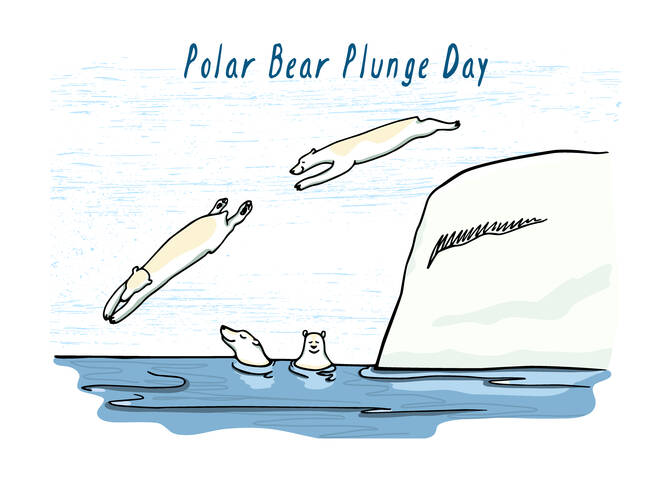Tag des Polar-Bär-Schwimmens
1. Januar, Donnerstag

Zweck und Bedeutung
Die Teilnahme am Eintauchen in Eiswasser zieht nicht nur Menschen an, die sich nach Extremsportarten sehnen, sondern trägt auch eine tiefe Symbolik in sich. Für viele Teilnehmer ist dies ein Test ihrer Willenskraft, eine Gelegenheit, sich selbst zu beweisen, dass sie körperliche Beschwerden überwinden und mit der Kälte zurechtkommen können. Darüber hinaus werden Tauchgänge häufig für wohltätige Zwecke durchgeführt, wobei der Erlös der Veranstaltung Bedürftigen zugutekommt oder verschiedene Gemeinschaftsprojekte unterstützt.
Wie der Tauchgang verläuft
Vorbereitung. Die Teilnehmer versammeln sich in der Regel an einem vorher ausgewählten Ort, beispielsweise an einem Fluss, See oder Meer. Vor dem Start wärmen sich viele Menschen durch körperliche Übungen oder andere Aufwärmmaßnahmen auf.
Eintauchen. Wenn alle bereit sind, springen die Teilnehmer entweder vom Ufer aus ins eisige Wasser oder springen von Plattformen. Viele von ihnen bleiben nur wenige Minuten im Wasser, um einer Unterkühlung vorzubeugen.
Ausstieg und Erholung. Nach dem Tauchgang steigen alle schnell aus dem Wasser und begeben sich in warme Räume oder spezielle Bereiche, wo sie sich mit heißen Getränken oder warmer Kleidung aufwärmen können.
Traditionen und Feiertage
In vielen Ländern findet das Eisbärentauchen rund um Neujahr oder Weihnachten statt und ist damit ein Symbol der Erneuerung und des Neustarts zu Beginn des Jahres. In den Niederlanden zum Beispiel lockt ein traditioneller Neujahrstauchgang namens Nieuwjaarsduik jedes Jahr am 1. Januar Tausende von Menschen an, die in das kalte Wasser der Nordsee springen.
In den USA sind solche Tauchgänge an Silvester oder Thanksgiving beliebt und haben oft einen wohltätigen Zweck.
